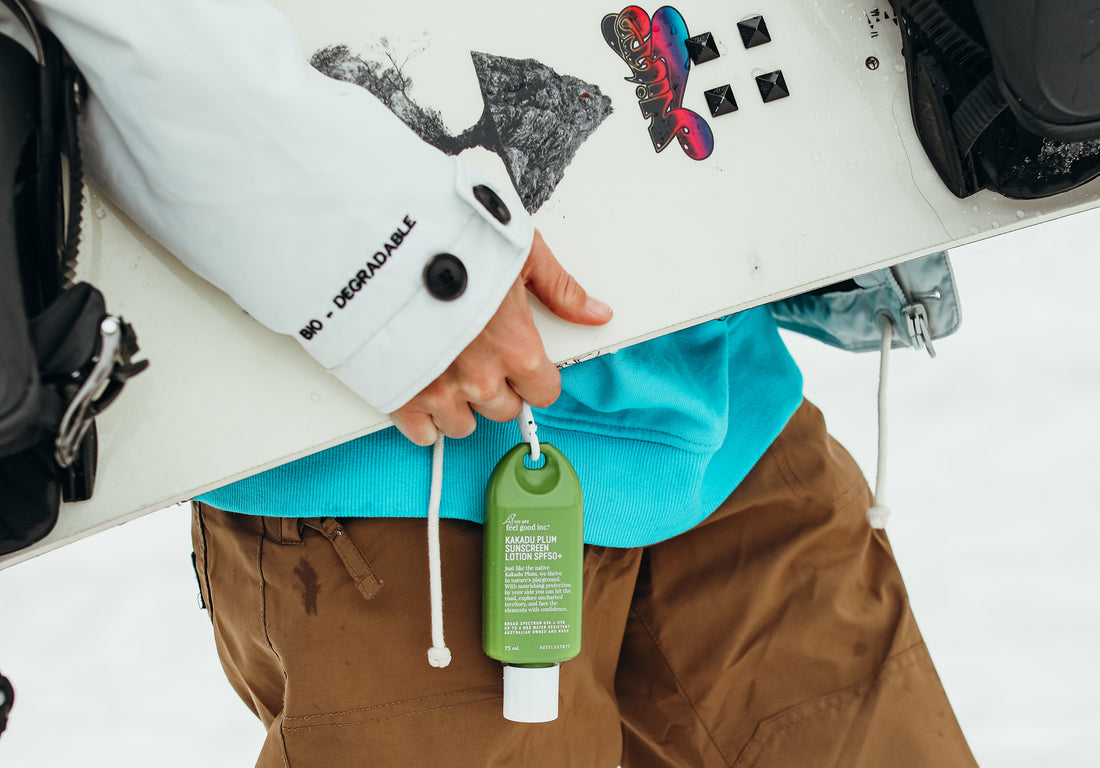
Do You Need to Wear Sunscreen in Winter?
The short answer is yes, you do need to wear sunscreen in Winter.
TAKEAWAYS
- Use sunscreen on exposed areas whenever UV levels are 3 or above
- In most parts of Australia, UV levels are over 3 all year round
- Winter sun causes damage on a deeper level and can cause fine lines & wrinkles, pigmentation, sunspots, and skin cancer
When winter rolls in, the days get cooler and cloudier, bringing relief from the scorching hot summer days Australia is renowned for. Most people assume that cloud cover and low temperatures mean you can't get burned so they ditch sun protection.
Unfortunately, this isn't the case in Australia. In fact, it can take less than 10 minutes for sun damage to occur when exposed to ultraviolet (UV) light without wearing sunscreen.
If you're going to be in direct sunlight for more than a few minutes, you should still wear sunscreen in winter.

Why Do I Need Sunscreen if It Isn’t Hot?
According to dermatologist Carly Roman, as quoted in GQ Magazine, "Most people want to ease up on sunscreen use during the winter months, as the sun feels weaker and they are less likely to burn.”
But that's simply not true. In fact, Australia has some of the highest UV levels in the world and our winter sun can still do some serious damage. We also have one of the highest skin cancer rates in the world, with a staggering 2 out of 3 Aussies being diagnosed with skin cancer before they turn 70.
In winter, the Ultraviolet B (UVB) is reduced by cloud cover, but the Ultraviolet A (UVA) is sti. UVB is what generates a "burn" or redness to the skin, whereas UVA penetrates deep into your skin layers and causes long-term damage to the skin including premature aging. So, while you might not see any sunburn, the damage is far deeper than you realise. Both UVB and UVA rays are silent killers and they don’t care if it’s cloudy or if you’re hiding indoors - they’ll find you.
So don’t think you can skip the sunscreen just because you can’t feel the burn during the winter months. Heat and the sun's UV rays are not related. Deciding whether to apply sunscreen or not depending on if it's hot and sunny is a recipe for disaster.
Not just any sunscreen will do—you need a broad-spectrum sunscreen with at least SPF 50 protection. While all sunscreens use UV filters to absorb ultraviolet light and convert it to heat, broad-spectrum sunscreens offer protection against both UVA and UVB rays.
Still not convinced you should wear sunscreen in winter? Wearing sunscreen is the most important step in your skincare routine as sunscreen prevents aging. It increases hydration (bye bye flaky, itchy skin), reduces skin cell damage, and protects against the signs of aging – including fine lines, wrinkles, age spots, and sagging.
And did we mention it protects you against skin cancer?

When Should I Apply SPF in Winter?
Think the beach in summer is the only place you need to worry about sunburn? Think again.
Applying SPF is just as important in winter, it should be step 3 in your daily winter skin care routine.
The Cancer Council recommends wearing sun protection (which includes not only sunscreen but also protective clothing) whenever the UV rating is 3 or above. And guess what? Down Under, that UV rating sits above three pretty much all year round.
This means that even if you're inside during the winter months, if you're near windows or reflective surfaces, you can still get skin damage from harmful UV rays if you're not wearing sunscreen.
Going skiing in the mountains or to the snow? Brace yourself for a double dose of UV radiation. Altitude boosts UV levels, and snow reflects up to a whopping 90% of UV radiation, doubling your exposure.
So, don’t slack on reapplying sunscreen, even when it’s chilly out. Winter sunscreen use is as essential as it is for summer beach days.

What is the Best Winter Sunscreen?
Not all sunscreens are created equal. It may be tempting to go for a sunscreen with a lower SPF (SPF stands for sun protection factor) in the winter months, but even on cold days, sun exposure can damage your skin cells and increase your risk of skin cancer.
You should use sunscreen that is SPF 50 as a minimum as this offers the highest level protection. Always use broad spectrum sunscreen as it will protect you against both UVA and UVB rays.
Be sure to reapply every couple of hours to protect skin properly, as wind, rain, and snow can all mess with its effectiveness, and reapply more often if you're active, sweating, or exposed to water.
We Are Feel Good Inc. has SPF 50 sunscreen for all skin types (including sensitive skin). All of our sunscreens are non-greasy and we have formulas packed full of added extras like vitamins, emollients, and essential fatty acids including shea butter.
And be sure not to forget the final step in your SPF routine - SPF50 lip balm. Lips are often neglected when it comes to sun protection and there's not much worse than painful chapped lips in the cooler months.

Protect Your Skin All Winter
Winter sun might not result in sunburn as easily as in summer, but it’s still doing long-term damage beneath the surface making sunscreen essential.
While clouds offer some protection against UVB rays, UVA rays are a different story. They penetrate deep into your skin, causing dry skin, age spots, pigmentation, and upping your risk of skin cancer.
From Perth to Sydney chances are, the UV levels will hit three or more most days during the winter months. And once it hits that mark, it only takes a few minutes for skin damage to occur even on the chilliest days, and that long-term damage can't be undone.
Keep an eye on the UV index, especially on those sunny winter days, and never leave home without SPF 50 sunscreen and protective clothing to avoid sunburn and sun damage. If you are out and about when the UV levels are high, seek shade where possible. Your skin will thank you for it.
Shop Winter Sun Protection






